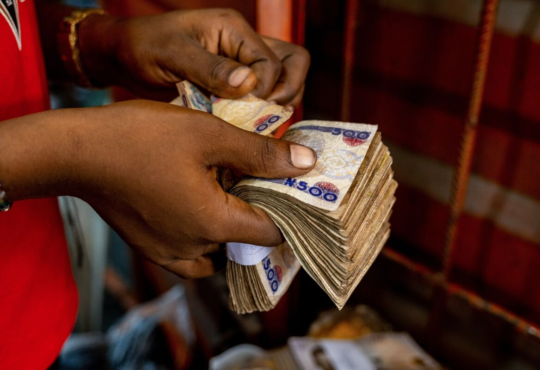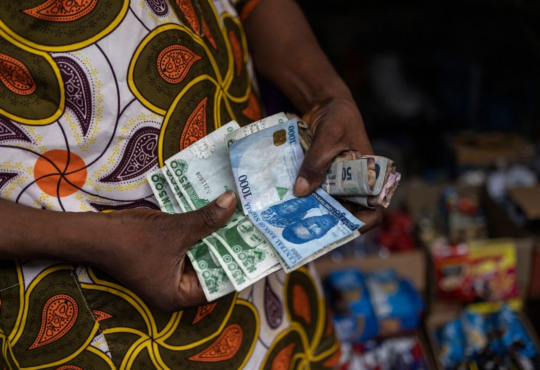
Pedestrians carry boxes of goods across a busy road near a giant advertising screen showing US … [+]
It’s bad enough that fintech startups have to grapple with the challenge of competing for funds in a global venture capital market that’s experiencing a funding drought. There is an extra hurdle for those using foreign capital to create new financial products in Nigeria: the value of the country’s currency has fallen 43% over the past year alone thanks to recent currency reform.
Nigeria is Africa’s biggest economy–it’s home to more than 220 million people and the continent’s leading destination for startup funding. A substantial portion of its financial transactions still occur in cash, creating a fertile ground for the development of multiple fintech solutions.
“There is a bit of instability happening in the country right now,” says Luci Fonseca, lead partner at San Francisco-based Base10 Partners, which has funded multiple Nigerian businesses, including payments startups Nomba and Okra and e-commerce firm Bumpa. “It creates a number of challenges for a business that charges in naira and reports its revenue in U.S. dollars.”
The massive depreciation of the local currency puts pressure on businesses in multiple ways, according to Gbenga Ajayi, lead partner at VC firm QED
“If you’re from Nigeria, from Egypt, or even from Kenya, you’re very much aware that when your currency starts to depreciate, it affects spending power, purchasing power, and there is just a lot of uncertainty,” says Ajayi.
Last year, African startups raised 227 rounds of funding, according to CB Insights, 174 of which went to Nigerian companies. More than 80% of the investors who financed Nigerian businesses this year before the foreign exchange market’s liberalization were based outside the country, according to PitchBook data, underscoring the significance of foreign capital within the country’s business landscape.
Hanu Fejiro Agbodje, chief executive officer of Patricia, takes a selfie photograph with attendees … [+]
Nomba raised $30 million in May 2023, largely funded by foreign venture capitalists at a valuation of $148 million, according to PitchBook. Lagos-based e-commerce startup Sabi secured $38 million in May at a $300 million valuation, while electronic medical records provider Helium
Some of the strategies startups are employing to manage currency risks include attracting more customers who transact in dollars; paying local employees, vendors and partners with naira reserves; and adding fees for customers who make payments in naira.
“The startups that are mitigating the reform best are those that already started hedging against the naira even before the reform,” says Mathew Saunders, head of investment at venture capital firm Future Africa. Another method he has seen companies use is “diversifying the customer base to include more international players that can make payment in dollar equivalents,” he says.
Currencies in China, India, Turkey, and Argentina are among the major emerging market currencies that have also come under pressure this year, driven in part by a stronger U.S. dollar. But the situation takes a different turn in African nations such as Nigeria, Egypt and Kenya, which are finding it increasingly difficult to obtain hard currencies like dollars, pounds or euros.
For countries like Nigeria, which has a long history of supplying dollars to the foreign exchange market to keep the local currency stable, the limited dollar reserves make it challenging for the Central Bank of Nigeria (CBN) to meet the demand of dollars for transactions like imports, where suppliers often require payment in dollars.
Authorities allowed the pegged naira currency to trade more freely in June after foreign reserves fell further to $34 billion from $39 billion a year earlier. With only 35% of the current reserves available for use, according to Abdulazeez Kuranga, macroeconomic strategist at Lagos-based Cordros Securities, “the low liquidity position clarifies why the CBN’s FX supply to the official windows has been underwhelming.”
Since the devaluation on June 14, 2023, the value of the naira has dropped a whopping 40% against the United States dollar in the official window, the currency market where government transactions occur. With inflation at 24% in July, a weaker service demand could potentially put a strain on startups’ revenue and, subsequently, their valuations, especially since some of them generate earnings in naira but report their financials in U.S. dollars.
Nigeria’s central bank authorities say all hands are on deck to stabilize the exchange rate. However, should the currency situation fail to improve, startups backed by foreign capital would have to intensify efforts to significantly boost earnings in order to assuage the impact of the devalued naira or come up with strategies to mitigate these risks.






